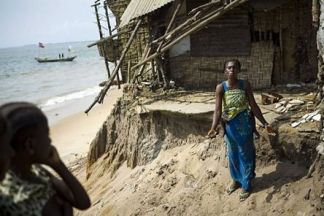 The Superintendent of Grand Bassa County, Julia Duncan Cassell, has renewed calls to save Buchanan, the county’s capital, from sea erosion, in the wake of unrelenting encroachments and gradual reduction and deformation of the City’s size and shape by the Atlantic Ocean.
The Superintendent of Grand Bassa County, Julia Duncan Cassell, has renewed calls to save Buchanan, the county’s capital, from sea erosion, in the wake of unrelenting encroachments and gradual reduction and deformation of the City’s size and shape by the Atlantic Ocean.
Tens of thousands of people occupy Buchanan which plays host to headquarters of huge concessionaires including world steel giant AreclorMittal and Buchanan Renewable.
The bustling city, one of the highly populated in the country, has faced the burnt of sea erosion for the past few years (with several buildings and homes washed away) but things have become even worse, as the global climate change continues unabated.
Superintendent Cassell said the continued encroachment of the sea on the City of Buchanan is ‘very worrisome’ because, according to her, Buchanan is losing land space on a daily basis.
“The sea erosion is something that we’re still battering with, and is getting worse by the day,” Madam Cassell asserted.
She citizens, along with county authorities have made series of public plead aimed at getting the attention of national government and international partners, but response has been slow.
Superintendent Cassell disclosed that some countries, especially Sweden, responded with financial assistance to help rescue the city from the threat, but the money was given to the United Nation Development Program to carry on the project.
“Unfortunately UNDP is yet to start the project,” she continued. “The partners are slow in responding; this sea erosion thing is getting terrible; lower Buchanan has lost her actual land space. In fact, it is getting worse on a daily basis.”
Buchanan is one of the three costal cities selected by the Liberian Government to benefit from a US$2.9 million project as part of battling the impact of climate change in the country.
Monrovia and Robertsports (capital of Grand Cape Mount) are the other cities that will benefit from the project. The US$2.9 million, according to Liberia’s Vice President Joseph Boakai, is being provided by the Climate Change Least Developed Countries Fund.
Walls will be built between the cities and the sea to prevent their washing away, the Vice President disclosed late October when the Government of Liberia officials launched the National Climate Change Secretarial in Moravia.
But as the start date of the project remains unknown, Superintendent Cassell laments that each time she visits lower Buchanan, she observes that portion of the area has been washed away and quick effort was needed to obstruct the threatening situation.
“For this reason, during President [Ellen Johnson] Sirleaf’s visit to Buchanan on the cabinet retreat [October, 2010], she visit the affected area and after that visit she immediately asked us to put an emergency task force together which involves Ministry of Lands Minds and Energy with others relevant stakeholders to see how national government can start with the prevention process before the international partners can come in,” Madam Cassell related.
The Superintendent told journalists that relocation process to assist those already affected by the sea has been put into place, and four families have benefited from the relocation exercise.
“All those benefiting from the relocation process are people with valid land deeds who have lost their properties at the result of the sea erosion,” Madam Cassell noted.
She explained there is also a voluntary relocation process for any of the occupants of the affected areas which are densely populated by Fanti fishermen, predominantly Ghanaian nationals.
Meanwhile residents of the area being affected by the sea told reporters that even though they see the sea encroachment as a daily concern, but the new site set aside by the county authority is far away from the sea.
According to them, all of their activities are based near and on the sea, and any attempt to relocate them far from the ocean will create hardship for them. They also pleaded with the Government of Liberia to include them in its resettlement exercise.
But Superintendent Julia Duncan Cassell has ruled out any possibility of including the Ghanaians into government’s resettlement process which is only intended to help those whose properties has been demolished by the sea erosion.
She said that the fishermen are mere squatters and they had had less to do with investing in the county, despite the huge economic benefits in their activities. “They make all the money in that place but prefer to take it back to Ghana; so, there is no way we can include them amongst our citizens who have deeds and have lost their properties as the result of the sea erosion,” Superintendent Cassell added.


